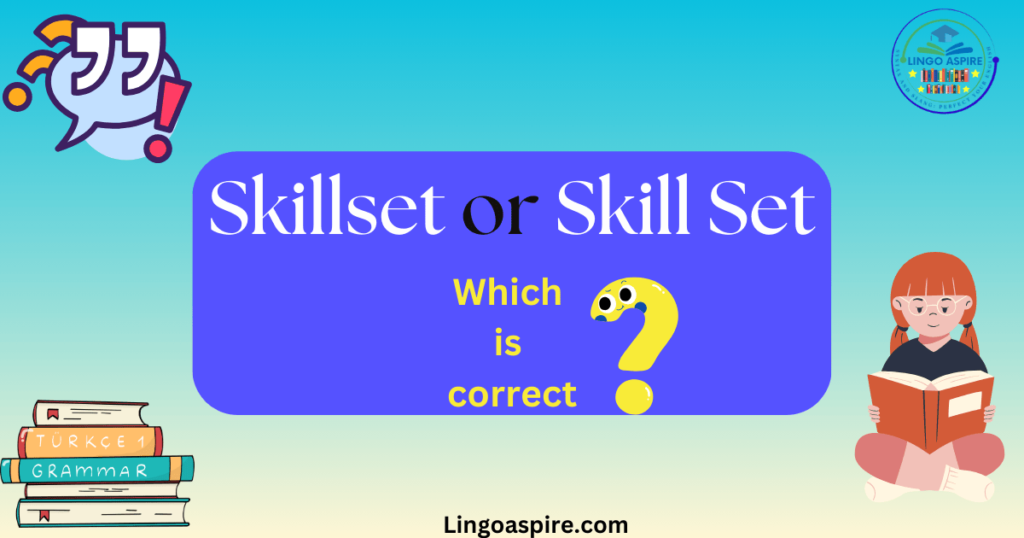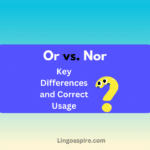Language is ever-evolving, and one of the most confusing areas can be the use of similar terms. Take the terms “skill set vs skillset,” and “skill-set.” You’ve likely seen them used interchangeably in emails, resumes, and job descriptions. While they might appear to mean the same thing, there are important distinctions in their usage.
Why Is There Confusion?
The confusion surrounding “skill set vs. skillset,” and “skill-set” arises from how language develops over time. Historically, “skill set” has been the standard term, written as two separate words. Over time, language evolves, and new forms of words appear. “Skillset” as a single word is a more recent development that has grown in popularity, especially in online contexts and informal writing. Meanwhile, the hyphenated version, “skill-set,” introduces yet another layer of complexity.
As language evolves, it’s common for words to shift in spelling and meaning. Some people may use “skillset” because it feels more modern. While others might stick to “skill set” because it’s what they’ve always used. The introduction of “skill-set” adds to the confusion, making people wonder if it’s correct to hyphenate the term. But how do you know which form to use, and why is this important?
Quick Summary:
- “Skill set” is the most universally accepted form.
- “Skillset” is growing in popularity but is considered less formal.
- “Skill-set” is rarely used and generally should be avoided.
What Is a “Skill Set”?
To understand the confusion, it’s essential to first understand what a “skill set” is. A “skill set” refers to a collection of abilities, talents, or expertise that someone has acquired through experience, training, or education. This can include a range of technical or soft skills, depending on the context. For example, a person’s “skill set” might include project management, teamwork, communication, and problem-solving abilities.
A “skillset” is essentially the same thing. The difference is that it’s written as one word. It is a modern, informal take. On the traditional “skill set” is most often used in less formal settings, like content, blogs, or social media posts. While “skillset” might be seen more frequently in the digital age, especially in industries like technology, “skill set” remains the correct and widely accepted form in professional and academic writing.
Skillset vs. Skill Set: The Differences and the Correct Usage
When it comes to deciding between “skill set vs. skillset,” there is a clear winner: “skill set” is the preferred, grammatically correct term. This term is an example of a compound noun, where two words work together to form a single concept. Similar examples of compound nouns include “high school” and “living room.”
The reason why “skill set” is considered the correct usage is that it follows established grammar rules for compound nouns in English. “Skillset” has gained popularity, particularly in casual writing, but it is still not technically correct in formal, professional, or academic contexts.
| Feature | Skill Set | Skillset |
|---|---|---|
| Correctness | Preferred | Not Technically Correct |
| Usage | Formal & Informal | Informal |
| Popularity | More Common | Less Common |
What About “Skill-Set” (Hyphenated)?
The use of hyphens in English can be tricky, especially when it comes to compound nouns. A hyphen is often used to avoid confusion and clarify the meaning of a word. However, not all compound nouns require a hyphen. In the case of “skill set,” a hyphen is unnecessary because there is no ambiguity in meaning.
Hyphenated words, like “mother-in-law” or “well-being,” typically serve to clarify complex concepts, but “skill-set” does not. Most style guides, including Merriam-Webster and the Oxford English Dictionary, list “skill set” without a hyphen, suggesting that hyphenation is not needed in this case.
In summary, while “skill-set” does exist, it should generally be avoided in favor of “skill set” unless it is part of a specific, established phrase. Stick to “skill set” for professional writing to ensure clarity and consistency.
Historical Usage of “Skill Set” and “Skillset”
The term “skill set” has been around since the mid-20th century, gaining ground in technical and professional fields in the 1970s. It has long been the standard term used to describe a person’s abilities and competencies. “Skillset,” on the other hand, is a newer variation that has grown in popularity over the past couple of decades. As language continues to evolve, “skillset” has found its place in casual writing and online communication, but it still hasn’t overtaken “skill set” in professional or formal contexts.
Both terms mean the same thing—essentially a person’s collection of abilities—but the form in which they appear has changed over time. The growth of “skillset” highlights how language adapts and changes in response to modern needs, such as the increasing reliance on digital communication and informal tones.
Regional Differences in Usage
Although “skill set” is the most universally accepted form, regional differences can influence whether people use “skillset” or “skill-set.” In American English, “skillset” is often used in informal contexts, especially online or in job postings. On the other hand, British English tends to favor “skill set” in both formal and informal writing. Australian and Canadian English follow similar trends, preferring the two-word version.
If you’re writing for an international audience or in a professional setting, it’s safest to stick with “skill set.” That way, you can avoid any confusion that might arise from regional preferences.
Grammar and Style Guides on “Skill Set”
Most established grammar and style guides, including the Chicago Manual of Style and the AP Stylebook, recommend using “skill set” as the correct form. These guides focus on maintaining clarity and consistency in writing. They advise against using “skillset” in formal contexts and stress that “skill set” is the correct and professional choice.
These guidelines are widely accepted in journalism, academia, and professional writing, so when in doubt, consult these sources for confirmation. They will help ensure that your writing adheres to the most widely recognized and respected standards in the field.
Public Perception and Trends
Analyzing trends can offer insight into how language evolves and how public perception shapes word usage. A quick look at Google Trends data shows that the term “skillset” has been rising steadily in search popularity over the past decade. This suggests that more people are becoming familiar with the term and using it in everyday language.
However, in professional contexts, particularly on platforms like LinkedIn, “skill set” remains the dominant form. In job descriptions and resumes, companies still prefer the more traditional “skill set.” This trend reflects the ongoing importance of maintaining professionalism in certain areas of communication, especially when discussing competencies and job-related abilities.
Examples in Context
To better understand the proper use of “skill set” and “skillset”, let’s examine a few examples:
| Context | Example Sentence |
|---|---|
| Personal Skills | His skill set includes leadership, strategic planning, and communication. |
| Career Development | You need to develop a broad skill set if you want to advance in your career. |
| Job Requirements | This position requires a skill set in software development, project management, and communication. |
| Workplace Trends | Skill sets are constantly evolving in today’s competitive job market. |
These examples demonstrate the correct usage of “skill set” in both informal and formal contexts. While “skillset” might be used in casual settings, using “skill set” in professional documents like resumes, job postings, and business communication is essential.
Synonyms and Related Terms
Several synonyms and related terms can replace “skill set” depending on the context. These include:
| Term | Definition |
|---|---|
| Competencies | A person’s abilities in specific areas. |
| Expertise | Specialized knowledge in a particular field. |
| Qualifications | The skills and experience required for a role. |
| Proficiencies | The degree of skill or competence in an area. |
Each of these words can be used in place of “skill set” when you want to emphasize a person’s abilities in specific areas. For example, “competencies” is often used in job descriptions, while “expertise” highlights someone’s specialized knowledge.
Conclusion
In conclusion, while the terms “skillset” and “skill-set” are becoming more common, “skill set” remains the preferred and grammatically correct form. Whether you are discussing your personal abilities, creating a resume, or writing a job description, it’s best to stick with “skill set” to maintain professionalism and clarity.
As language continues to evolve, we may see “skillset” become more widely accepted, especially in informal and digital contexts. However, for formal writing—especially in professional, academic, or business communications—“skill set” should always be your go-to choice.
Sources
- Merriam-Webster Dictionary – Offers definitions, pronunciation, and examples of both “skill set” and “skillset” in different contexts.
- Oxford English Dictionary – Provides detailed definitions and the history of the term “skill set,” including its usage over time.
- The Chicago Manual of Style – A widely respected resource on grammar and style guidelines.







